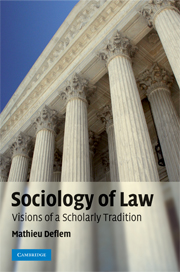Book contents
- Frontmatter
- Contents
- Preface and acknowledgements
- Introduction: sociology, society, law
- Part I Theoretical foundations of the sociology of law
- Part II Development and variations of the sociology of law
- Part III Sociological dimensions of law
- Part IV Special problems of law
- Conclusion: Visions of the sociology of law
- Bibliography
- Index
Conclusion: Visions of the sociology of law
Published online by Cambridge University Press: 05 June 2012
- Frontmatter
- Contents
- Preface and acknowledgements
- Introduction: sociology, society, law
- Part I Theoretical foundations of the sociology of law
- Part II Development and variations of the sociology of law
- Part III Sociological dimensions of law
- Part IV Special problems of law
- Conclusion: Visions of the sociology of law
- Bibliography
- Index
Summary
It has been the primary intention of this book to review and discuss theoretical and substantive contributions in the sociology of law in order to present this disciplinary specialty as a unique and valuable academic endeavor. It has not been a goal of this book to offer an assessment of the discussed theoretical and substantive efforts in the sociological study of law beyond their merits as contributions to the field as a whole. To be sure, the present study has been informed by a theoretically driven orientation that guided the analytical framework used to review the history and systematics of the sociology of law. But the employed model allowed, and was explicitly conceived for, a plurality of perspectives to be brought out. In its treatment of themes in theory and research, this study has been necessarily selective, yet also focused on contributions that have been exemplary in representing and furthering the sociology of law.
It may be useful to conclude by identifying some central themes and issues that run through the sociology of law as it has unfolded over the course of its historical and intellectual development. Identifying these gains and pains of the sociology of law may also lead to guide our understanding of where the specialty area might be and should be going in the near future.
- Type
- Chapter
- Information
- Sociology of LawVisions of a Scholarly Tradition, pp. 271 - 277Publisher: Cambridge University PressPrint publication year: 2008



